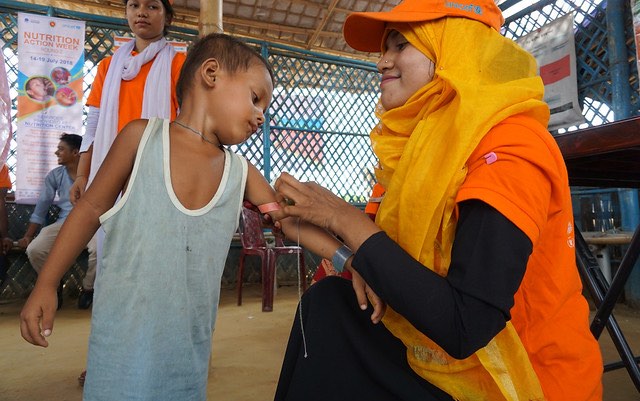In 2017, more than 600,000 Rohingya people fled violence in Myanmar and crossed into southeastern Bangladesh, joining 200,000 to 400,000 other forcibly displaced Rohingya already there. None are officially recognized as refugees.
In Oct. 2018, researchers from IFPRI and the Bangladesh Institute of Development Studies (BIDS) conducted a household survey of Rohingyas and neighboring host communities on incomes, employment, food security, and nutrition—finding that while a potential humanitarian disaster had been averted, Rohingya in Bangladesh face grim long-term prospects. A July 10 IFPRI policy seminar explored these issues.
“The humanitarian food assistance system in place is working as well as anyone could reasonably expect it to work,” said IFPRI Non-Resident Fellow and Cornell Prof. John Hoddinott, who helped to conduct the survey.
Most residents are receiving generalized food distribution and one third participate in an e-voucher system that allows them to purchase food using what are essentially debit cards, he explained. These cash transfers are the most important source of income for recipients, he said, but are still not sufficient. The Rohingya in Bangladesh are the poorest population he has worked with in 30 years of experience in developing countries, Hoddinott said: They subsist on $20 monthly or $0.65 per day, compared to a global poverty line typically of $2 per person per day.
Diet is also a problem for displaced Rohingya, Hoddinott said. Fruits and vegetables essential to health are in short supply, and most food purchases go to rice, grains, pulses, and nuts. Among women,16% have an indicator of thinness; this figure rises to 30% among pregnant women, leading to increased low birthweight for babies, with consequences that can last throughout their lives.
Overall, Hoddinott concluded, conditions for Rohingya improved during 2017-2018, but acute malnutrition numbers remain high, and addressing this problem must be an important focus for the international community.
While Bangladesh’s government, international actors, and NGOs prevented the potential humanitarian disaster that might have resulted from a sudden, huge influx of refugees, BIDS Senior Research Fellow Mohammad Yunus explained that continuing on the current path is untenable. The Rohingya have only limited economic prospects in camps, he said. Currently the host community’s wage rates are about 1.4 times those of the displaced, and double those of women specifically.
However, policy options are limited. Allowing displaced Myanmar nationals to work outside the camps in local labor markets could cause wages of the host population to fall sharply—up to 25%, he said, due to the similarity in human capital.
“Migration issues are controversial everywhere,” said Paul Dorosh, director of IFPRI’s Development Strategy and Governance Division, who also worked on the survey. Workable solutions do exist, he said, pointing to a model simulation that suggests that integrating Rohingya workers into a wider geographical area labor market, including the port city of Chittagong, would make the potential loss of income for the host population much smaller, with real wages declining by only 4%-5%. If the government of Bangladesh and donors provide income transfers and invest in job creation, he said, that smaller decline could be mitigated.
Ruth Vargas Hill , lead economist for Poverty and Equity Global Practice at the World Bank, focused on the long term effects for the Rohingya, noting that despite improving conditions in camps, the survey found that people felt worse off. Hill questioned how households were ensuring their longer-term food security given that they were using costly coping strategies, depleting assets to survive, and expressed worry about declining life expectancy.
“Even if humanitarian aid were sustained, if there were no donor fatigue, the continued improvement of food security would not be seen,” Hill said. She asked what mechanisms other than cash transfers or capital investments could help to create successful economic opportunities for the Rohingya.
“The first and best solution is a voluntary, safe, and dignified return to Myanmar, but in the absence of that, are there ways to promote sustainable future return by investing in the populations–displaced and host communities today?” asked Center for Global Development Senior Policy Fellow Cindy Huang, Huang referenced a couple papers that she wrote on the economic opportunities and asked how the international community can contribute in acknowledgment of the global public good that Bangladesh is providing in hosting the displaced Rohingya.
“Humanitarian efforts have opened up a window of opportunity to consider longer-term solutions,” Dorosh concluded, “and it’s important that we look for solutions, and that something is done so that we don’t just forget about the Rohingya who have been [in Bangladesh] for two years. There are difficult policy choices to deal with these forcibly displaced Myanmar nationals, and these choices are the choices of the Bangladesh people, their government, and to a large extent, the Rohingyas themselves.”
Katarlah Taylor is an IFPRI Senior Events Specialist.







